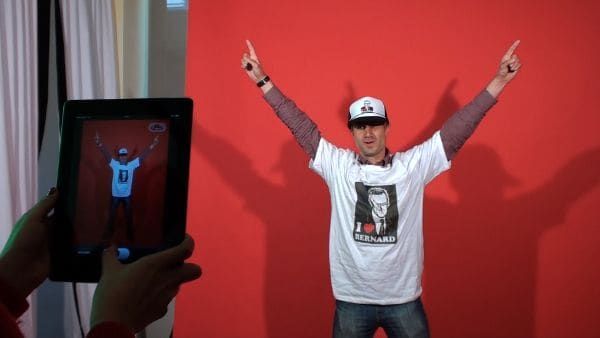Eye For Film >> Movies >> Thanks Boss! (2016) Film Review
Thanks Boss!
Reviewed by: Amber Wilkinson

Journalist François Ruffin says he was inspired by Michael Moore's Roger & Me to make his debut documentary and, like the American, he treats filmmaking as a contact sport, although between the capering he shows glimmers of thoughtfulness that are more reminiscent of the UK's Louis Theroux.
The ironically titled Thanks Boss!, accompanied by the satirical song of the same name by Les Charlots, is mirrored by Ruffin's attitude from the start. Driving around in a van with "I <3 Bernard" emblazoned on the side and almost permanently wearing a T-shirt with the same slogan, he explains how disappointed he is that France's richest man - Bernard Arnault - has come into conflict with his former workforce, vowing broker a dialogue of reconciliation. All of this, of course, is just a cute set up to introduce us to Arnault, the chief executive of LMVH group, who has, as of October 2016, an estimated worth of £34.7 billion according to Bloomberg. LMVH may not trip off the tongue, but it is the largest luxury goods brand in the world, with brands including Moet & Chandon, Dom Perignon, Louis Vuitton, Kenzo and Christian Dior.

Ruffin explains how former workers at Boussac - a company bought over by LMVH in the Eighties - saw Arnault promise to retain staff, only for him to shed virtually all of the company’s brands, save for the high-end Dior label and Bon Marche. Even the clothing names he maintained have shifted production to Poland, where the workforce is cheaper and it's depressing to see one manager at the current plant cheerfully explaining how the company is already looking at where it might move next in order to cut labour costs. British audiences may also find themselves drawing parallels with the Philip Green/BHS debacle or any number of companies who have relocated their manufacturing base. Workers, argues Ruffin, are very much dispensable in the world of shareholders and money making.
And it is towards shareholding that Ruffin first turns his attentions, encouraging those workers who are now unemployed to buy a share so that they can have their voices heard at the company AGM. This proves to be easier said than done, so he narrows his focus, zooming in on the Klurs family, whose hardship since both being made redundant by LMVH is so extreme that they are about to lose their house to creditors.
At this point, the film strays into thriller territory as Ruffin essentially encourages the Klurs - who have nothing to lose - to send what amounts to a blackmail letter to Arnault, suggesting that he help them out to the tune of 35,000 euros or watch them go public with their plight. Amazingly, one of the firm's security chiefs is sent to broker a deal, in exchanges that are caught on hidden cameras and it seems there will be further twists in the tail before victory for the little guy is secured.
There's no doubt that this is a major stunt that only succeeds in directly addressing the issues faced by a single family but Ruffin's documentary deserves credit for doing good on a small level and for raising the wider issues - even if he over-inflates the idea of himself as a modern day Robin Hood. He also gives a genuine insight into the anguish of the Klurs, a family who have worked hard their entire lives only to face the prospect of losing the lot, with one of them suggesting they should probably just kill themselves. Ruffin may bring a lot of laughs to this subject but there is no mistaking the tangible heartache underlying the humour. As for Arnault, the most damning thought of all is that he helps the Klurs, not through a sense of regret or even of compassion - but as a way of protecting his public image and brand.
Reviewed on: 02 Nov 2016
















